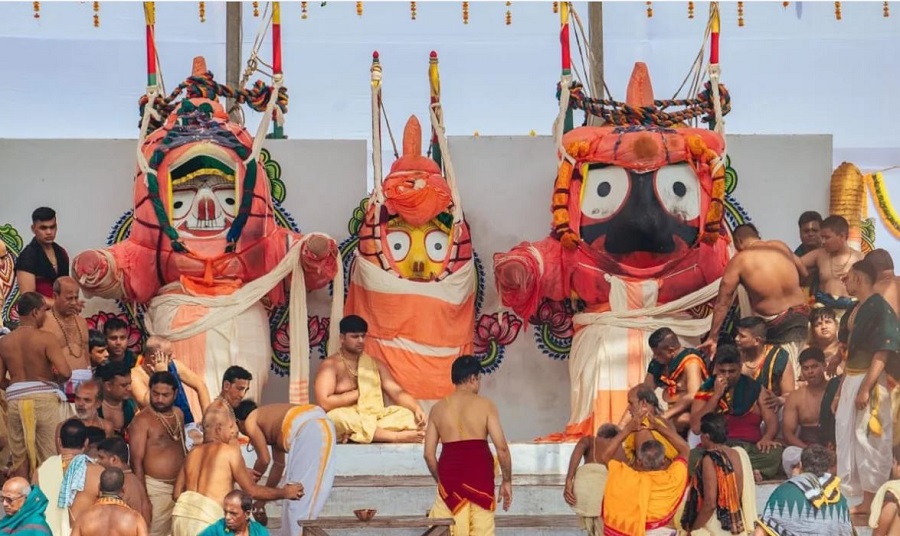Odisha: Thousands of devotees gather in Puri to witness 'Snana Yatra' of Lord Jagannath, Balabhadra, and Devi Subhadra
Thousands of devotees have gathered in Puri to witness the 'Snana Yatra' of Lord Jagannath and his siblings on the occasion of Deva Snana Purnima on Saturday. Read further on Dynamite News:

Puri: Thousands of devotees have gathered in Puri to witness the 'Snana Yatra' of Lord Jagannath and his siblings on the occasion of Deva Snana Purnima on Saturday.
Deva Snana Purnima of Lord Jagannath, Balabhadra and Devi Subhadra commenced on Saturday morning. All deities were brought to Snana Mandap to take a bath. Lakhs of devotees gathered outside the temple to see the rituals.
Debasnana Purnima, also known as Snana Yatra, is celebrated on the full moon day of the Hindu month of Jyeshtha, which usually falls in June. This festival holds immense religious significance, as it is believed to be the birthday of Lord Jagannath. The deities are taken out in a grand procession from the sanctum sanctorum of the Jagannath Temple to the Snana Mandap, an elevated platform where the bathing ritual takes place.
Lord Jagannath along with his siblings Balabhadra and Subhadra, are brought out from the sanctum sanctorum to the Snana Mandap, a special bathing platform. On this day, the deities undergo a ceremonial bath with 108 pitchers of sacred water.
Also Read |
Indian Navy to showcase operational might off Odisha's Puri coast for Navy Day 2024
After the bath, the deities are adorned in Gajanan Besa, which means they are dressed to resemble Ganesha, the elephant-headed deity. This unique attire, also known as Hati Besa, has deep symbolic meaning.
On this day, the deities undergo a grand ritual bathing with 108 pitchers of sacred water, a practice believed to purify and honour them. This is one of the rare occasions when the deities are publicly visible, giving devotees a close view before the famous Rath Yatra.
Following this bath, it is believed that the deities become unwell and are moved into a period of seclusion known as "Anavasara," where they are kept away from public view for about 15 days. This period is considered a time of recuperation, as the deities are believed to suffer from fever due to the extensive bathing ritual.
During Anavasara, the deities are offered special medicinal preparations known as 'Phuluri Tela' to aid in their recovery.
Also Read |
#RathaYatra2023: Lord Jagannath, his siblings 9-day sojourn begins in Puri
Devotees can have a glimpse of the 'Patti Dians' (painted images) of the deities during this time, instead of the actual idols.
After the Anavasara period, the deities re-emerge for the grand Rath Yatra, where they are placed on their magnificent chariots and taken on a procession through the streets of Puri. This marks their annual journey to the Gundicha Temple, and it is one of the most celebrated and attended events, symbolising their blessing and grace upon all devotees.
Thousands of devotees from Bangladesh and ISCON have also gathered at Puri to see the deities.
During the period between the Snana Yatra and the Rathyatra, people from all across the world come to Puri. (ANI)
 Dynamite News
Dynamite News 